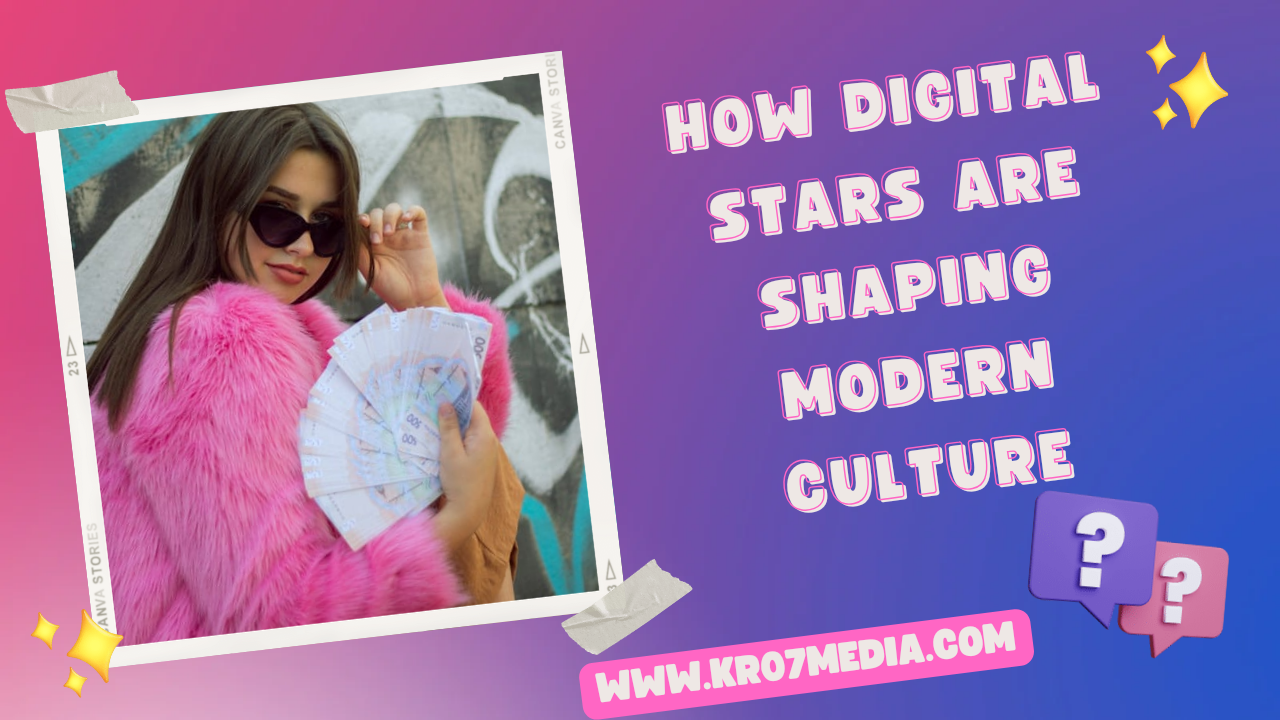In the 21st century, digital stars—social media influencers, YouTubers, and content creators—are redefining fame, culture, and social interaction. These individuals, who command massive followings across platforms like Instagram, TikTok, YouTube, and Twitch, are not only shaping consumer behavior but also influencing cultural trends, societal values, and even political discourse. Here's how digital stars are transforming modern culture.
1. Redefining Fame and Celebrity
The traditional idea of celebrity—centered around Hollywood stars, musicians, and athletes—has undergone a significant shift. Today, digital stars can command just as much, if not more, influence than traditional celebrities. With direct access to their audience, influencers connect in more personal ways, creating a sense of intimacy and relatability that wasn’t possible with older forms of fame. This shift has democratized the idea of fame, allowing ordinary individuals to rise to prominence through their content, skills, or personalities.
Platforms like YouTube and TikTok provide easy access to audiences without the need for intermediaries, such as talent agents or media companies. Creators can build followings by sharing anything from beauty tutorials to gaming commentary or social justice content. This decentralization of fame allows for more diversity in who becomes a public figure, highlighting voices from various backgrounds and interests.
2. Impact on Consumer Behavior
Digital stars have become powerful tastemakers in the consumer landscape. Through sponsored posts, product reviews, and personal endorsements, influencers have created a new form of advertising that resonates with younger audiences. This shift is grounded in trust: followers believe in the authenticity of the influencers they admire, often more so than they would trust traditional advertisements.
Brands now collaborate with influencers to target niche audiences, resulting in a massive rise in influencer marketing. According to studies, influencer marketing has proven to be more effective than traditional forms of advertising because it feels more organic and personal. Consumers are no longer just passive receivers of advertisements; they actively engage with content and creators, shaping the kinds of products and messages they are exposed to.
3. Cultural and Social Influence
Digital stars often set trends in fashion, music, beauty, and language, influencing how people dress, what they listen to, and even how they communicate online. Platforms like Instagram and TikTok have become incubators for global fashion trends, with influencers showcasing new styles that quickly become viral. Hashtags, dance challenges, and memes created by digital stars have infiltrated mainstream culture, shaping how people express themselves.
More than just entertainment, many digital stars are also using their platforms for activism, advocating for social causes such as climate change, racial equality, and mental health awareness. This influence is especially strong among younger generations, who tend to look up to these influencers as role models. In this way, digital stars are playing an essential role in shaping public opinion on critical societal issues.
4. New Forms of Storytelling and Entertainment
Digital platforms have also transformed how stories are told and entertainment is consumed. The rise of vlogs, short-form content (TikTok), and live streaming has diversified the storytelling methods available to creators. This shift from traditional long-form content (like TV shows or films) to bite-sized, easily consumable content appeals to audiences with shorter attention spans.
Twitch streamers, for example, are not only playing video games but also creating interactive experiences with their viewers. YouTubers are producing documentary-style content, while TikTok stars are mastering the art of rapid storytelling in seconds. These new formats reflect the flexibility and adaptability of digital platforms, where creators can experiment without the constraints of traditional media.
5. Globalization of Culture
Social media has transcended borders, leading to a more globalized cultural landscape. Digital stars from different parts of the world can influence audiences worldwide, regardless of geographic location. For example, K-pop stars like BTS have gained international fame largely thanks to social media, where fans from across the globe can interact with their content.
Similarly, influencers from non-Western countries are also finding prominence on global platforms, challenging Western cultural dominance in the digital space. The sharing of content across cultural lines has facilitated cross-cultural exchanges, making the world feel more interconnected than ever before.
6. The Future of Fame in a Digital World
As digital platforms evolve, the role of digital stars in shaping modern culture will continue to grow. The lines between traditional media and social media are blurring, with even traditional celebrities moving to platforms like Instagram and YouTube to maintain relevance. The next generation of influencers may come from the metaverse, where virtual content creators and AI-generated stars are already starting to gain traction.
However, this digital fame also comes with challenges. Issues like digital burnout, privacy concerns, and the pressure to constantly produce content have raised questions about the sustainability of influencer careers. As social media platforms and influencer culture continue to evolve, navigating these challenges will be crucial for the future of digital fame.
Conclusion
Digital stars are not just reshaping how we consume content but are also influencing how we see the world. By democratizing fame, driving consumer trends, and offering new forms of storytelling, they are deeply embedded in the fabric of modern culture. As they continue to wield influence across fashion, politics, and entertainment, the cultural impact of digital stars will only grow, reflecting the evolving dynamics of a digitally connected world.



